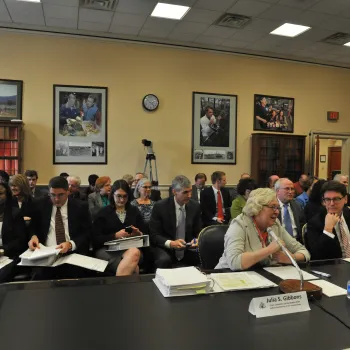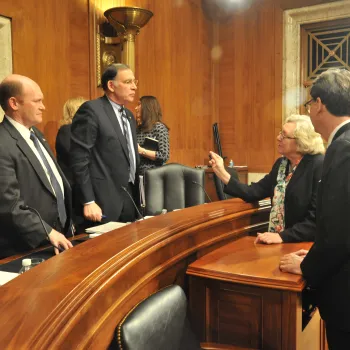In the face of an uncertain federal budget environment, the Judiciary has worked to secure the resources needed to enable the Judiciary to fulfill its Constitutional mission to provide fair and impartial justice.
Fiscal Year 2015 Funding for the Judiciary
Fiscal year 2015 began with a short-term spending measure that funded most of the federal government. On December 16, 2014, the President signed into law, the Consolidated and Further Continuing Appropriations Act of 2015 (Public Law 113-235), a multi-bill omnibus spending measure that funded most of the federal government, including the Judiciary, through fiscal year 2015. The omnibus provided the Judiciary with $6.70 billion in discretionary appropriations—a 2.8 percent ($182 million) increase above fiscal year 2014—which was essentially the full amount of the Judiciary’s funding appeal.
Fiscal Year 2015 Courthouse Funding
No funding for new courthouse construction was provided by Congress to the General Services Administration (GSA) in the fiscal year 2015 omnibus bill. The Judiciary Capital Security Program received $20 million to address security deficiencies in courthouse buildings where physical renovations are possible.
The 2014 Annual Report provides detail on the Judiciary’s fiscal year 2015 funding and a table of appropriations by account and fiscal year.
Fiscal Year 2016 Funding for the Judiciary
Fiscal year 2016 also began with a Continuing Resolution to fund the federal government until full-year appropriations were enacted. On December 18, 2015, the President signed into law the Consolidated Appropriations Act of 2016 (Public Law 114-113), a 12-bill omnibus spending measure funding the federal government for fiscal year 2016.
The omnibus spending bill provided the Judiciary with $6.78 billion in discretionary appropriations, an $80 million (1.2 percent) increase above the fiscal year 2015 enacted level.
The Salaries and Expenses account that funds court operating expenses received $4.93 billion, a $73 million (1.5 percent) increase above fiscal year 2015. Final funding included $19 million to expand the enterprise hosting and cloud-computing initiative to more courts; $7 million for replacement of the Judiciary’s email system; and $15 million to expand the use of evidence-based practices to further reduce recidivism rates of offenders under federal probation supervision.
The Defender Services account received $1.0 billion. Although this is a 1.1 percent ($12 million) decrease from fiscal year 2015, it is nonetheless equal to full funding when combined with significant prior-year unobligated balances available for obligation in fiscal year 2016. The bill allows panel attorneys to receive a cost-of-living adjustment (COLA) to their hourly rate in fiscal year 2016, and the report accompanying the bill specifies a $1 above-COLA increase to the non-capital hourly rate, resulting in a new rate of $129 effective January 1, 2016. This is the first increase above inflation to this rate since fiscal year 2010.
The Court Security account received $538 million, a $24 million (4.7 percent) increase above fiscal year 2015 and equal to full funding. This level is sufficient to fund essential security needs and to begin implementation of a new court security officer (CSO) staffing standard that will increase the number of CSOs at courthouses.
The Fees of Jurors account received $44 million, an $8 million (15.3 percent) decrease from fiscal year 2015 that, when combined with prior-year unobligated balances, is sufficient to fund base program requirements. The omnibus bill did not include funding or legislative language to implement the requested $10 increase in the juror daily attendance fee (from $40 to $50).
The omnibus bill also included one-year extensions of nine temporary district judgeships whose authorizations expire in 2016, and a cost-saving provision sought by the Judiciary to allow a U.S. probation officer who has been appointed in one district to provide supervision services to another district when both courts consent.
A detailed funding table for Judiciary accounts follows.
Fiscal Year 2016 Courthouse Funding
The omnibus bill provided $948 million in lump sum funding to the GSA for the construction of courthouses on the Judiciary’s current Courthouse Project Priorities (CPP) plan (formerly the Five-Year Courthouse Construction Plan), an unprecedented infusion of resources for the Judiciary’s courthouse construction program. Inclusion of this courthouse funding in the omnibus demonstrates the confidence Congress has in the Judiciary’s space planning process and to the Judiciary’s adherence to the priorities established by the CPP. The majority of the 11 projects on the CPP have been on the list for more than 10 years. The space and security needs in these locations have only grown in the absence of funding for new courthouses since fiscal year 2010, (the exception being the Mobile, AL, project funded in fiscal year 2014.)
The Appropriations Committees intend that the $948 million will be utilized to fund fully the top eight courthouse projects on the CPP approved by the Judicial Conference at its September 2015 session: Nashville, TN; Toledo, OH; Charlotte, NC; Des Moines, IA; Greenville, SC; Anniston, AL; Savannah, GA; and San Antonio, TX.
Partial construction funding was provided for Harrisburg, PA, the ninth project on the CPP. Administrative Office staff will work with GSA and judicial districts with courthouse projects on the CPP to update space requirements and cost estimates as needed, and to ensure that planning decisions are consistent with congressional intent. The omnibus also includes $53 million under GSA for new construction and acquisition of facilities that are joint U.S. courthouses and federal buildings in Greenville, MS, and Rutland, VT, and $20 million for the Judiciary’s Capital Security Program.
| Appropriation Account |
FY 2015 Final Enacted |
FY 2016 Budget Request |
FY 2016 Re-Estimate |
FY 2016 Enacted |
|---|---|---|---|---|
|
U.S. Supreme Court Salaries & Expenses Care of Building and Grounds |
74,967 11,640 |
75,717 9,953 |
75,838 9,964 |
75,838 9,964 |
| U. S. Court of Appeals for the Federal Circuit | 30,212 | 30,841 | 30,872 | 30,872 |
| U. S. Court of International Trade | 17,807 | 18,145 | 18,160 | 18,160 |
|
Courts of Appeals, District Courts & other Judicial Services (CADCOJS) Salaries & Expenses |
||||
| Direct | 4,846,818 | 5,036,338 | 4,918,969 | 4,918,969 |
| Vaccine Injury Fund | 5,423 | 6,045 | 6,050 | 6,050 |
| Total | 4,852,241 | 5,042,383 | 4,925,019 | 4,925,019 |
| Defender Services | 1,016,499 | 1,057,616 | 1,004,949 | 1,004,949 |
|
Fees of Jurors & Commissioners |
52,191 | 52,411 | 48,199 | 44,199 |
| Court Security | 513,975 | 542,390 | 538,196 | 538,196 |
| Subtotal, CADCOJS | 6,434,906 | 6,694,800 | 6,516,363 | 6,512,363 |
| Administrative Office | 84,399 | 87,590 | 85,665 | 85,665 |
| Federal Judicial Center | 26,959 | 27,679 | 27,719 | 27,719 |
| U.S. Sentencing Commission | 16,894 | 17,540 | 17,570 | 17,570 |
| Total Discretionary, The Judiciary | $6,697,784 | $6,962,265 | $6,782,151 | $6,778,151 |
Annual Report 2015
- Annual Report 2015
- Funding/Budget
- The Courts and Congress
- The Federal Bench in 2015
- Accountability and Resource Utilization
- Facilities and Security
- Public Outreach
- Court Operations and Case Management
- Defender Services
- Probation and Pretrial Services
- Financial and Human Resource Initiatives
- Information Systems and Cybersecurity
- Recent and Proposed Amendments to the Federal Rules
- In Profile




